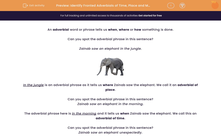An adverbial word or phrase tells us when, where or how something is done.
Can you spot the adverbial phrase in this sentence?
Zainab saw an elephant in the jungle.

In the jungle is an adverbial phrase as it tells us where Zainab saw the elephant. We call it an adverbial of place.
Can you spot the adverbial phrase in this sentence?
Zainab saw an elephant in the morning.
The adverbial phrase here is in the morning and it tells us when Zainab saw the elephant. We call this an adverbial of time.
Can you spot the adverbial phrase in this sentence?
Zainab saw an elephant unexpectedly.
Here, the adverbial unexpectedly tells us how Zainab saw the elephant. We call this an adverbial of manner.

Fronted Adverbials
Many adverbials can be moved to the start of a sentence to become fronted adverbials.
In the jungle, Zainab saw an elephant.
In the morning, Zainab saw an elephant.
Unexpectedly, Zainab saw an elephant.
All we need to do is add a comma after the fronted adverbial to separate it from the rest of the sentence.
Here are some examples of fronted adverbials of time, place and manner.
| Time (when) | Place (where) | Manner (how) |
| All of a sudden, | Beneath the trap door, | Clumsily, |
| On Thursday | Over the cloud, | With great care, |
| In March, | Behind the fence, | Without hesitation, |
| Immediately, | In the distance, | Happily, |
Can you add a fronted adverbial to the simple sentence below?
Bertie ate his dinner.

You might have used a fronted adverbial of time:
In the evening, Bertie ate his dinner.
You might have used a fronted adverbial of manner:
Hungrily, Bertie ate his dinner.
You might have used a fronted adverbial of place:
In the dining room, Bertie ate his dinner.
In this activity, you’ll be on the hunt for fronted adverbials.
Remember we must put a comma after them!








